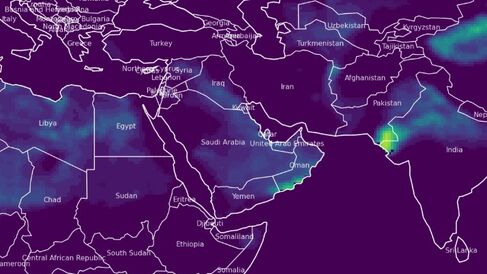
This year, several students joined the ICCS team as summer interns, with projects ranging from environmental modelling to science communication. During this eight-week programme, the interns had the chance to hone their skills in a variety of different fields and get a taste for what it’s like to do research in academia.
Michael Lin, a maths undergraduate student here at Cambridge, worked with Early Career Advanced Fellow Dr Robert Rouse to study the evolution and impact of forest fires. He reflected on his experience:
"My internship was on using machine learning methods to model forest fires. I was initially interested in this project as it gave me the chance to explore the field of environmental modelling, an area adjacent to (but mostly uncovered by) the Maths undergraduate course.
In particular, my project focused on training machine learning models, using climate variables as well as antecedent proxy variables (running averages) to replace local variables (in this case, replacing soil moisture at multiple levels with average temperature and precipitation over the last various timeframes). The models (mainly random forest / gradient boosting classifiers) were trained on a roughly 100 sq km extent in the Richardson Backcountry (northeast of Alberta) on data from 2010 to 2014.
Throughout my project, I have learnt much about geospatial data wrangling, mostly in the form of conducting exploratory analysis or pre-processing datasets using Python modules such as xarray and dask. Overall, I have come away from this project with a broader view of the process that goes into data-driven modelling in environmental research, as well as experience training models (and fixing them when they break!)."
Rishul Karia, an MPhil quantitative climate and environmental sciences, also worked with Dr Rouse through Cambridge Zero in collaboration with the UN Department of Political and Peacebuilding Affairs.
"The image below I believe encapsulates what I have done as of yet during the project very well - it is a source genesis map displaying the regions where sand and dust storms (SDS) formed from 2003-2024. The dynamic element helps to encapsulate the seasonality of the phenomena, underlining which regions are susceptible to SDS formation at various times of the year.
More generally, I have thoroughly enjoyed my time as an intern at the ICCS, through which I have been given the opportunity to collaborate with one of the leading researchers in the machine learning (ML) for climate field. Furthermore, as someone with limited ML background the inter-disciplinary nature of the internship drew me to applying, with the opportunity provided to work with colleagues from Cambridge Zero and the UN Department of Political and Peacebuilding Affairs. Both the research and networking opportunities have been invaluable, and I am thoroughly looking forward to the final presentation day next week. Overall, this experience has been electric, and one I would highly recommend to anyone considering applying in the future!"

Alison Spadaro, a Part III maths student studying theoretical physics, worked with Josh Stevens on science communication.
"My main role was to ensure resource accessibility and keep all of our information up to date. Science communication is incredibly important these days, when there’s so much misinformation out there. This is especially true for climate science, which will have such a direct impact on the general population. For my internship, I focused on making the ICCS more visible, particularly the informational resources we have to offer. For example, I edited and published a series of lectures from our annual summer school, which you can find on our YouTube channel.
Over the course of the summer, I got the chance to experiment with a variety of media platforms, and I was able to improve my skills in video editing, short form writing, and web design among others. Overall, I would definitely recommend this internship for anyone interested in getting experience in science communication."
Aileen Zheng has just completed the second year of her BSc Mathematics at UCL. She said: "I applied for this internship to gain practical experience in AI and to explore potential directions for my future work. The programme has been very helpful in this regard, giving me the chance to learn new skills and clarify my interests.
"During the internship, I worked on the Fluid parser to support new syntax for what we call 'transparent text' – a way of writing scientific text (e.g. climate reports) that is directly linked to the underlying data set. My work mainly focused on refining the grammar rules, creating test cases, and refactoring the implementation to make the parser more robust.
"Through this process, I deepened my understanding of language parsing and compiler techniques, and gained hands-on experience in linking data with scientific writing."
Michael, Rishul and Alison presented their projects on Wednesday 27 August at the CMP presentation day in the Centre for Mathematical Sciences. Stay tuned for more information about next year’s internship opportunities!
